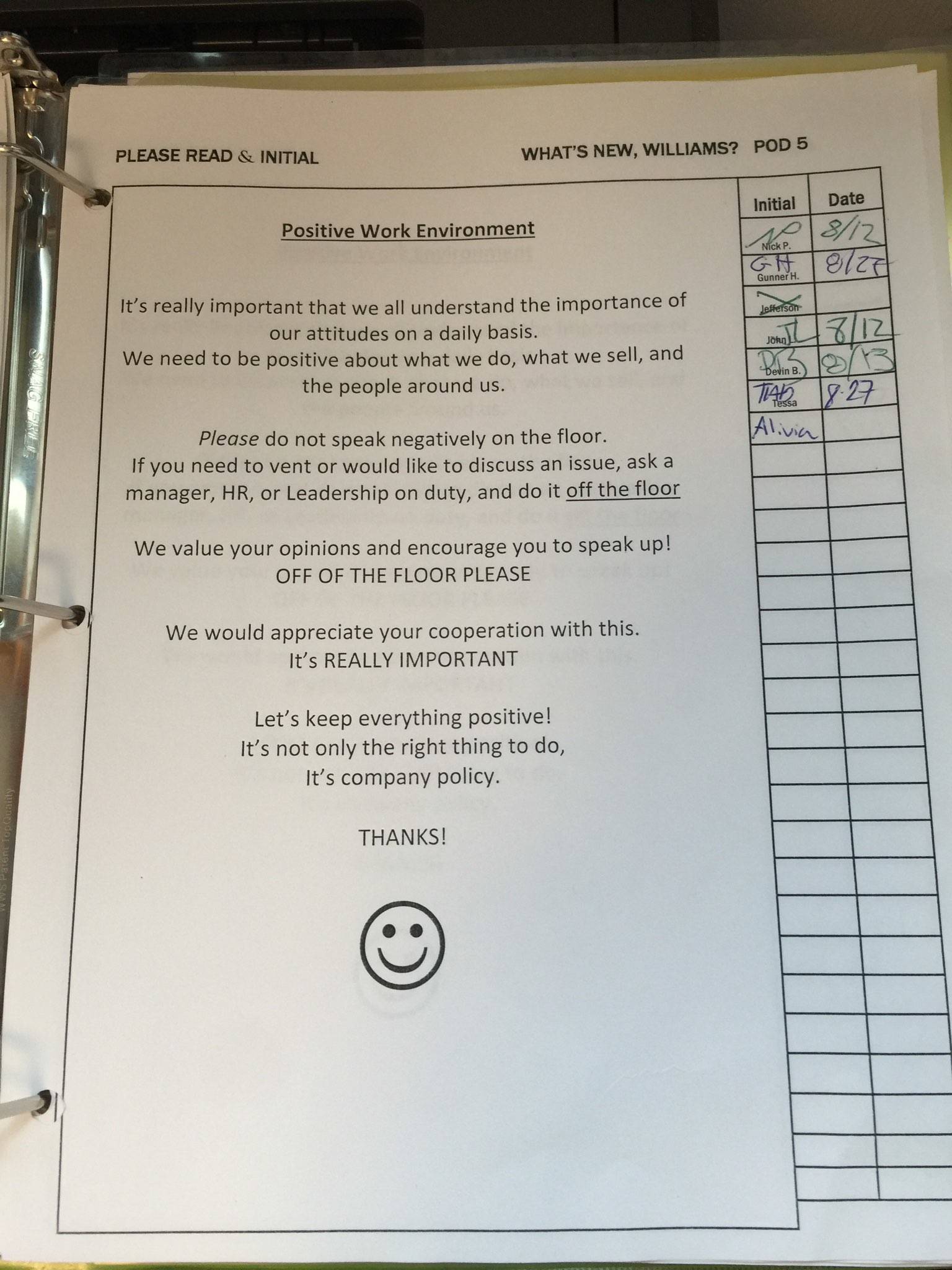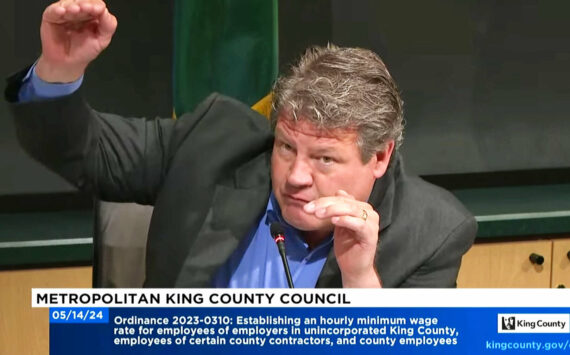It was New Seasons Market’s purported support of LGBTQ rights and its commitment to hire from within the local community that originally drew former employee Adrian Mendoza to work for the Portland-based grocer in July 2015. But within two weeks of working at the Williams District location, Mendoza (who prefers gender-neutral pronouns) noticed that the promise of a convivial work environment didn’t live up to their expectations. For starters, they believed that management unfairly demanded emotional labor of the employees by asking them to sign a document that agreed to a positive work environment and abstinence from negative discussions about workplace conditions. As a collective bargaining proponent, Mendoza saw this as a veiled attempt to prevent workers from unionizing.
“I had challenged that at one point and I was like, ‘Yo, this sounds kind of illegal.’ And so they immediately pulled that from the staff’s communications log,” Mendoza says. The grocer told Seattle Weekly it was unable to comment on whether management had asked employees to sign such a document, but Seattle Weekly was able to obtain a copy of the document.
Then Mendoza complained of other more incendiary incidents. One day last spring, the management’s lack of training became obvious when a manager suggested that Mendoza apply baking soda to a chemical burn on their arm that they’d acquired while cleaning the workspace. Instead, Mendoza called the chemical company, which provided advice on how to treat the burn, remarking that baking soda would have worsened it. Within a year, they’d mentally compiled a slew of complaints from themself and their coworkers. “There was a lot of management hostility, a lot of gaslighting, micromanaging, transphobia, racism, sexism,” Mendoza recalls. “I mean, anything you could possibly think of was happening at the store that I was working at.”
In an effort to bring what they considers unfair working conditions to light, Mendoza recently joined the Good Jobs Coalition—a collective of racial and economic justice organizations—on its campaign to call attention to New Seasons Market opening two Seattle locations in Ballard and the Central District. On May 9, the coalition plans to host a demonstration outside of the Ballard store on its opening day. (The opening date for the Central District location had not yet been finalized or announced, according to Nicole Brooks, a New Seasons Market spokesperson.)
The imminent openings have watchdog groups, labor attorneys, union organizers, and community activists worried. They point to a lack of management training, unsafe work conditions throughout the 20 locations, and efforts to stymie union organizing efforts as harbingers of harmful work culture that they fear would spread to the forthcoming Seattle locations. Local Legislative District Democrats even passed a resolution last July that opposed the expansion of New Seasons Market in Seattle.
Mendoza helped spearhead organizing efforts at his Portland store last summer “because I felt that there needed to be a lot of change and accountability in the company,” yet their complaints mostly went unnoticed. They and others reached out to United Food and Commercial Workers locals 555 and 21 to help them demand better wages, benefits, and working conditions.
Mendoza says that the $13.25 an hour they made after two years on the job was barely enough to live in the increasingly unaffordable Portland area, where the median price of rent for a one-bedroom apartment is over $1,300, according to a January 2018 Zumper National Rent Report. Sometimes Mendoza’s parents helped them make ends meet, but some of their coworkers weren’t as lucky. Some of their colleagues were homeless, Mendoza says, and would resort to eating the store’s expired food (which would make them sick) because they couldn’t afford groceries. Additionally, health care offered to employees came with such a high premium that it was unattainable for most workers.
But tension with New Seasons Market came to a head last fall when they passed around informational flyers, along with a petition that garnered hundreds of signatures from employees that requested management “sit down with us and seriously address the many concerns we have with the direction of the company.” Shortly thereafter, Mendoza said that then CEO Wendy Collie and Co-President Kristi McFarland interrogated them about their organizing efforts at the store for about 40 minutes. Mendoza was fired about three weeks later, along with another colleague who was also featured on the flyer. Although Mendoza says management claimed that they were “creating a hostile work environment,” they believed that their termination in October was an act of retaliation. “It kind of just shows the values they have—if you have an issue the door is right here, and if you can’t find it we’ll show it to you.”
New Seasons Market spokesperson Brooks denied allegations that the company intimidated or retaliated against staff who supported organizing efforts. “The National Labor Relations Board investigated two claims of retaliation and dismissed both claims as having no merit. No one has ever been fired from New Seasons for expressing their support of organizing efforts and no one ever will be,” Brooks wrote in an email to Seattle Weekly. “We believe that every voice matters and provide many avenues for staff to speak up and be heard.”
Then last fall, New Seasons Market hired Cruz & Associates, a labor relations consulting firm that is known for its union-busting tactics. Trump Ruffin Commercial LLC—the venture between President Donald Trump and casino owner Phil Ruffin—famously paid Cruz & Associates over $560,000 while it was battling with Trump International Hotel workers in Las Vegas who sought to unionize, and eventually succeeded. Yet Brooks told Seattle Weekly that the grocer was unaware of the firm’s past ties to Trump until after the consultants were hired, and were assured that Cruz & Associates currently does not have ties to Trump, his family, or anyone else in his administration. “Many of the staff of New Seasons has not worked in a unionized environment or been part of an organizing effort and asked us for information. To ensure they understood the process and their rights in an organizing effort, we hired Cruz and Associates, to hold voluntary information sessions for staff, which were completed in November of last year. We chose a firm owned and operated by a diverse, bilingual team,” Brooks explained.
However, Seattle-based labor attorney Laura Ewan says that New Seasons Market’s interrogation of Mendoza and hiring of the consulting firm are common tactics for employers seeking to discourage employees from forming unions. “If you’re a worker-friendly employer, and not just another corporation that’s trying to crush your workers’ attempts at better wages and worker conditions, you’re not hiring Cruz & Associates,” Ewan says. “If you’re hiring a union avoidance firm, then that’s because you’re specifically wanting to crush that organizing effort.”
The Northwest Accountability Project, a regional watchdog organization on right-wing extremism, found that New Seasons Market has financial ties to the Vancouver, Washington-based foundation M.J. Murdock Charitable Trust, which among other organizations, funds the conservative Christian organization Alliance Defending Freedom, a legal advocacy group that the Southern Poverty Law Center has declared an anti-LGBTQ hate group. “New Seasons is majority owned by Endeavour Capital, which is a private equity firm. And since 2000, Murdock has invested millions in Endeavour Capital, including the funds that control New Seasons,” says Northwest Accountability Project Executive Director Peter Starzynski. “So as New Seasons profits, this will benefit the Murdock Trust. And New Seasons claims to be this progressive grocer, but if you look deeper at this tie, they are tied to this organization that funds some pretty heinous organizations.”
Because of its financial connection to the Murdock Trust, the Northwest Accountability Project has submitted a complaint to B Lab, a non-profit that awards a designation called “B Corp certification” to socially and environmental responsible for-profit companies, including—currently—New Seasons Market. “Our goal is for them to be stripped of this designation so people understand who this grocer actually is,” Starzynski says. The New Seasons Workers United, the group that Mendoza helped spearhead to organize their former employees, also filed a complaint to try to remove the grocer’s B Corp certification, and says that B Lab has opened an investigation.
Along with concerns about ties to a hate group, anti-union efforts, and unsafe work conditions, the Occupational Safety and Health Association (OSHA) found that the recordable incident rate at six New Seasons Market locations was 94 percent higher than that of the grocery industry rate in 2016. And between 2012 to 2017, the Oregon Department of Agriculture and the Clark County Department of Health in Washington found 431 food safety code violations in inspections of 16 New Seasons Market locations.
Coalition members are also concerned about the company’s strategy for choosing locations in areas that are already experiencing displacement of minority communities. A 2015 The Oregonian report cited the company’s head of store development as defining the company’s expansion strategy as one that “targets neighborhoods in the process of gentrification … Often, the addition of a New Seasons will push rents and home values higher, adding to that process.”
Jill Mangaliman, executive director of Got Green, a local people of color-led environmental justice organization, is concerned that that tactic could further displace minority communities in the Central District. The neighborhood’s African American community has dwindled from nearly 80 percent in the early 1970s to less than 20 percent by 2016, according to The Seattle Times.
“Having a New Seasons in the Central District would be insulting for the community trying to stay rooted. Not only low income communities and communities of color couldn’t afford the food there, while New Seasons use the guise of ‘green company,’ it degrades the rich history of social justice and community organizing that has happened in the Central District, especially 23rd and Union,” Mangaliman wrote in an email to Seattle Weekly. “New Seasons is coming into the neighborhood, but catering to wealthier customers, not the community who has historically lived there.”
Mangaliman adds that the Ballard store would open in an area full of other markets that support unionized workers, such as a nearby Fred Meyer and QFC, and that New Seasons Market’s presence could lower standards throughout the local grocery store industry. “If folks don’t have living wage jobs that respects their dignity, how can we expect them to be able to stay in Seattle?”
However, Brooks is adamant that New Seasons Market is committed to empowering the local community. “Our mission is to be the ultimate neighborhood grocery store, a champion of the regional food economy and the friendliest store in town,” she wrote. “We look for neighborhoods that share our values around healthy food and healthy communities. We are deeply invested in hiring from our local communities, supporting vendors in local communities and advocating for policies that positively impact the people we serve.”
But some local residents are already concerned about the impact that the store will have on the Ballard neighborhood and the workers in the community. Ballard resident Alice Woldt says that she’s seen many unsettling changes in the 40 years that she’s lived in the neighborhood, such as the closure of a bowling alley her son frequented, and the demolition of homes that were replaced by towering apartments. Still, she said that the New Seasons Market’s imminent opening is the most disturbing. “When you get something like this in the community, it gives rise to the other employers [thinking] ‘Oh, well, if they can treat their workers like that, why can’t we?’ And so, it just becomes a race to the bottom instead of actually providing what should be provided for everybody in the community. Everybody.”










